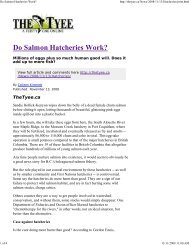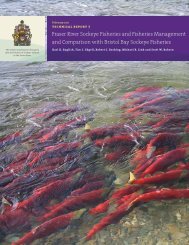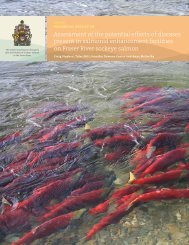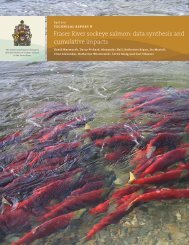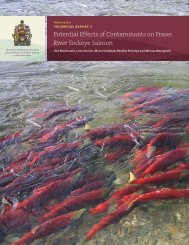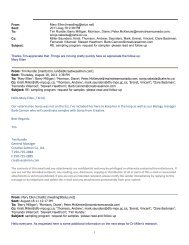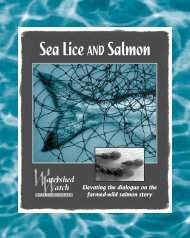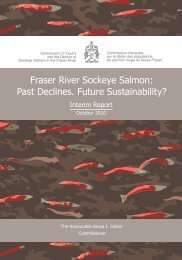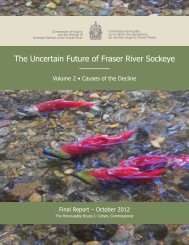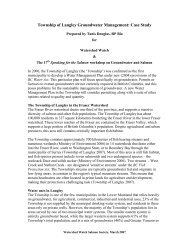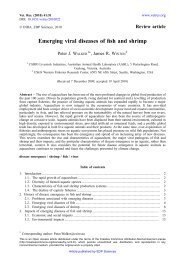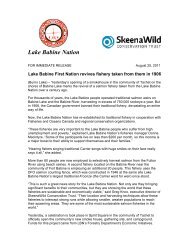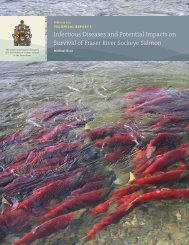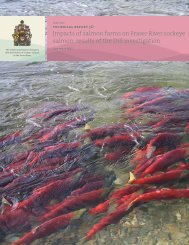CP32-93-2012-3-eng.pdf
CP32-93-2012-3-eng.pdf
CP32-93-2012-3-eng.pdf
Create successful ePaper yourself
Turn your PDF publications into a flip-book with our unique Google optimized e-Paper software.
Cohen Commission of Inquiry into the Decline of Sockeye Salmon in the Fraser River • Volume 3<br />
performance of Canada’s aquaculture industry. Of<br />
that sum, $25 million is devoted to innovation to<br />
enhance the aquaculture sector’s competitiveness<br />
and productivity, and a further $10 million supports<br />
the aquaculture sector’s ability to meet domestic<br />
market demands along with rigorous international<br />
trade and marketing requirements. 21<br />
I understand the rationale behind the Government<br />
of Canada promoting the salmon-farming<br />
industry and its products or providing funds to<br />
assist with that sector’s competitiveness. What does<br />
concern me, however, is that, when one government<br />
department (in this case DFO) has mandates<br />
both to conserve wild stocks and to promote the<br />
salmon-farming industry, there are circumstances<br />
in which it may find itself in a conflict of interest<br />
because of divided loyalties. For example:<br />
• There is a risk that DFO will not proactively<br />
examine potential threats to migrating sockeye<br />
salmon from salmon farms, leaving it up to<br />
other concerned parties to establish that there<br />
is a threat.<br />
• There is a risk that DFO will impose less onerous<br />
fish health standards on salmon farms than it<br />
would if its only interest were the protection of<br />
wild fish. Farmed salmon may tolerate certain<br />
diseases or pathogens differently from wild<br />
salmon, such that the farmed fish would not<br />
necessarily require treatment except for their<br />
potential to spread disease or pathogens to<br />
wild fish. (The treatment of sea lice is a good<br />
example: see the discussion in Volume 1,<br />
Chapter 9, Fish health management.)<br />
• There is a risk that DFO will be less rigorous in<br />
enforcing the Fisheries Act against the operators<br />
of salmon farms.<br />
I do not suggest that in every case DFO will favour<br />
the interests of salmon farms over the interests<br />
of wild fish; rather, it is the risk that it will do so<br />
that creates the conflict of interest. Because of its<br />
mandate to promote the salmon-farming industry,<br />
there is a risk that DFO will act in a way that favours<br />
the industry to the detriment of wild fish.<br />
I recognize that, in relation to wild salmon<br />
stocks, DFO’s mandate extends to promoting the<br />
commercial fishery as well as conserving those<br />
stocks. If that creates the potential for a conflict<br />
of interest, it can be largely addressed by the<br />
checks and balances I referred to in the section<br />
above on DFO’s mandate in relation to wild fish.<br />
DFO’s interest in promoting the wild fishery is<br />
tempered by its duty to conserve those same wild<br />
stocks: without a healthy resource, there can be<br />
no commercial fishery to promote. Protecting wild<br />
stocks while promoting salmon farms is, in my view,<br />
qualitatively different because there are no inherent<br />
checks and balances – promotion of salmon farms<br />
might, in some circumstances, prejudice the health<br />
of wild salmon stocks.<br />
As long as DFO has a mandate to promote<br />
salmon farming, there is a risk that DFO will act<br />
in a manner that favours the interests of the<br />
salmon-farming industry over the health of wild<br />
fish stocks. The only way to address this potential<br />
conflict is by removing from DFO’s mandate the<br />
promotion of salmon farming as an industry and<br />
farmed salmon as a product, and by transferring the<br />
promotion of salmon farming to a different part of<br />
the Executive Branch.<br />
I draw no conclusion about whether the<br />
Government of Canada as a whole should promote<br />
the salmon-farming industry or farmed salmon as<br />
a product. There may be meritorious reasons for<br />
the federal government to do so. If it chooses to do<br />
so, it is inevitable that conflicts will arise from time<br />
to time between the protection of wild stocks and<br />
the promotion of farmed salmon. In my view, when<br />
those conflicts do arise, they ought to be dealt with<br />
at the cabinet level.<br />
DFO’s obligations in relation to net-pen<br />
salmon farms<br />
3 The Government of Canada should remove<br />
from the Department of Fisheries and Oceans’<br />
mandate the promotion of salmon farming as<br />
an industry and farmed salmon as a product.<br />
Implementation of the<br />
Wild Salmon Policy<br />
When, in June 2005, after five years of development,<br />
Minister Geoff Regan released the Wild<br />
Salmon Policy (WSP), he stated that it “significantly<br />
transforms the management and conservation<br />
of wild salmon, their habitats and dependent<br />
12



